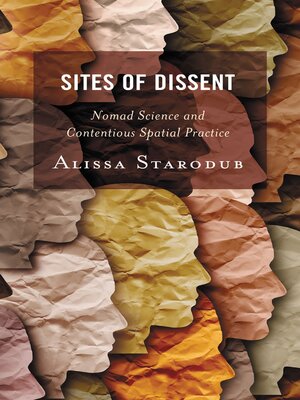Sites of Dissent
ebook ∣ Nomad Science and Contentious Spatial Practice · Creative Interventions in Global Politics
By Alissa Starodub

Sign up to save your library
With an OverDrive account, you can save your favorite libraries for at-a-glance information about availability. Find out more about OverDrive accounts.
Find this title in Libby, the library reading app by OverDrive.



Search for a digital library with this title
Title found at these libraries:
| Library Name | Distance |
|---|---|
| Loading... |
Contemporary articulations of dissent to social order and its production of truth cannot be ignored any longer. Hamburg during the G20 gathering; Washington, D.C., on the day of Trump's inauguration; the squares and streets of Paris and Tunis at the end of 2018. Public space is temporarily taken by those who rise against the powers that keep structural oppression and social order in its place. Not only riots, but collective social centres, protest camps and temporary as well as permanent occupations of lands and buildings are other, utopian spatial alternatives created by autonomous social movements to prefigure a horizontal social organization.
This book discusses spatial practices of autonomous social movements, the movements who 'see their everyday experiences and creations as the revolution they are making', together with these movements and in taking the diversity of their articulations into account. Sites of Dissent is thus the story of a daring attempt to create research practices for radical transformation which requires a radical transformation of research practices. During this attempt, methodological rules of scientific research are broken, and methodological heresy and wild experimentation with research practices take place.
Sites of Dissent aims at opening new possibilities of including diverse ways of knowing and speaking into a collective knowledge creation process, at overcoming the individualized isolation in which the researcher produces knowledge about the outside world; and it aims to create a space for collective learning about spatial practices of autonomous social movements, to learn with and from the movements.
This book discusses spatial practices of autonomous social movements, the movements who 'see their everyday experiences and creations as the revolution they are making', together with these movements and in taking the diversity of their articulations into account. Sites of Dissent is thus the story of a daring attempt to create research practices for radical transformation which requires a radical transformation of research practices. During this attempt, methodological rules of scientific research are broken, and methodological heresy and wild experimentation with research practices take place.
Sites of Dissent aims at opening new possibilities of including diverse ways of knowing and speaking into a collective knowledge creation process, at overcoming the individualized isolation in which the researcher produces knowledge about the outside world; and it aims to create a space for collective learning about spatial practices of autonomous social movements, to learn with and from the movements.







